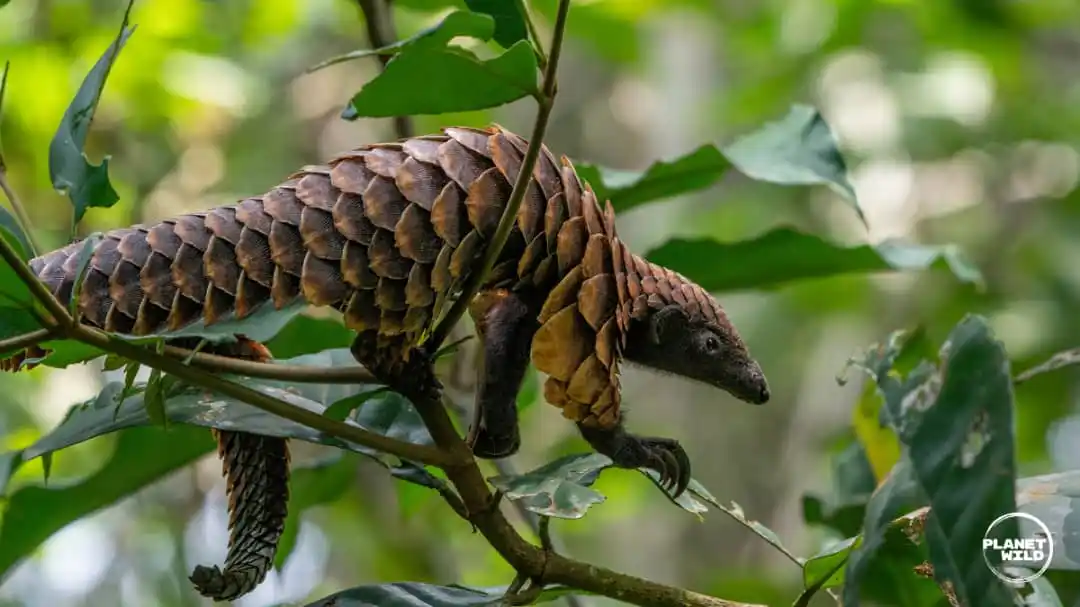
Climate Newsroom
June 20, 2025 at 01:11 AM
Africa’s sacred messenger under siege as pangolin remains world’s most trafficked mammal
The pangolin moves slowly across the dry earth, covered in scales that glint faintly in the fading light, and for a moment, it seems like something out of a dream, yet deeply familiar to those who have grown up in rural areas listening to stories whispered by elders around evening fires.
In Zimbabwe, seeing a pangolin is not just rare, it is sacred, and those lucky enough to witness one believe it carries a message from the ancestors, a quiet signal that something good is coming.
The number of steps it takes before it disappears into the bush is said to reveal how many good years lie ahead, and to harm such a creature is not only a crime under the law, it is also seen as a deep violation of the natural order and a break with traditions that have guided communities for generations.
Pangolins, nocturnal creatures famed for their full armour of scales, are the most trafficked mammal in the world according to the World Wildlife Fund, and all eight species are on the red list of threatened species and at risk of extinction
Despite a global ban on the trade of pangolins introduced in 2017 under the Convention on International Trade in Endangered Species (CITES), the animal remains the world’s most trafficked mammal. Between 2000 and 2019, the equivalent of more than 895,000 pangolins were trafficked globally.
Tikki Hywood Foundation Chief Executive Officer Lisa Hywood describes this as a tragic and often overlooked reality, largely because global conservation efforts and public attention have historically focused on more prominent and charismatic species such as elephants and lions.
“The pangolin unfortunately is still the world’s most trafficked mammal and that is a very sad title for any species to have. I think the world up until recently has focused on your more charismatic animals like the elephants, the lions,” she said.
Zimbabwe’s government has taken a proactive and collaborative approach to addressing issues related to pangolin conservation within the country.
“Zimbabwe has had a very proactive government when it comes to pangolins, and we have collectively identified the problems and worked together to resolve them within our own country.”
“In fact, out of the 35 range states in Africa that have Pangolins, Zimbabwe is the first range state to actually develop a Pangolin management conservation plan which was developed and instituted last year in Zimbabwe.”
Under the Zimbabwean law, any person convicted of the unlawful killing, possession of, or trading in any Specially Protected Species is liable, on first conviction, to imprisonment for a period of not less than nine years, and for a second or subsequent conviction to imprisonment for a period of not less than eleven years.
“In Zimbabwe, there is a mandatory sentence of nine years imprisonment for anyone found in possession of any part of a pangolin. This ranges from a live pangolin to a single scale. The sentence is the same whether you have ten pangolins or just one scale. It is a mandatory nine years in jail,” she said.
Hywood called for greater commitment and collaboration from governments across Africa for pangolin conservation to be effective. She emphasized the importance of learning from countries that are already taking proactive steps and understanding the different threats to pangolins in various regions, which is crucial for developing effective protection strategies.
“I think going forward, what we need to do is understand more about the species and identify the threats. From northern Africa to southern Africa, the threats differ slightly. In western and central Africa, I believe the biggest threat is the bushmeat market. As you move down to southern Africa, where we are based, the threats are different, mainly trafficking and trade. We need to be mindful of these threats in order to overcome them.”
“What needs to happen across the rest of Africa is greater buy-in from governments in those countries, for them to better understand the plight of pangolins within their own borders, and then, collectively, to identify which nations have been proactive and work together as one continent.”
Demand for African pangolins in countries such as China and Vietnam has been growing as the number of Asian pangolins has dwindled over the years, to the point where two of the four Asian species are now on the critically endangered list.
The other two are endangered and all four African species of pangolin were classed as vulnerable by the International Union for Conservation of Nature when all commercial trade in pangolins, also known as scaly anteaters, was banned in 2016.
Data from International Organization for Animal Welfare (IFAW), this illegal trade does not just harm individual pangolins, it wreaks havoc on entire ecosystems, as pangolins act as gardeners when they forage for meals of ants and termites. They burrow into the ground, aerating the soil and cycling nutrients, while keeping insect populations in control, they are vital protectors of forests and other plant life.
Fortunately, there’s a new light of hope for pangolins shining against this dark, dangerous backdrop, this week, the U.S. Fish and Wildlife Service (USFWS) has taken one step closer to recognizing all pangolin species under the Endangered Species Act (ESA).
This decision could be a huge win for wildlife, it will reinforce the international commercial trade ban for US imports and prohibit interstate sale of live pangolins and their body parts. This decision would also help heighten global awareness about pangolins’ plight and how important they are to our planet.
The protection of one of the World’s most illegally trafficked mammals is a message that needs to be heard and understood by everyone if we are to give this animal a fighting chance.
The Tikki Hywood Foundation through the aid of its partners and various conservation groups has lobbied with the assistance from Government conservation mandated entities like Zimbabwe Parks and Wildlife Management Authority (Zimparks) and the Ministry of Environment to have the Pangolin designated as a specially protected species.

👍
1